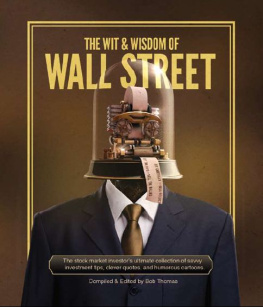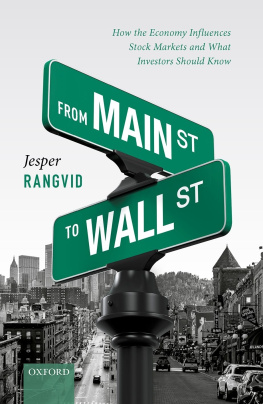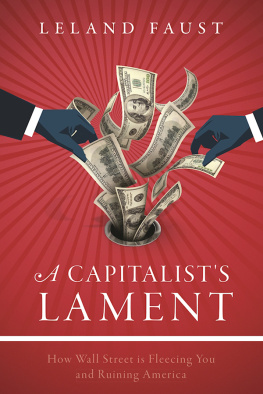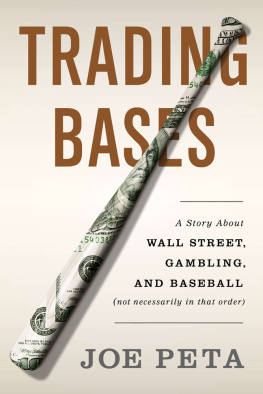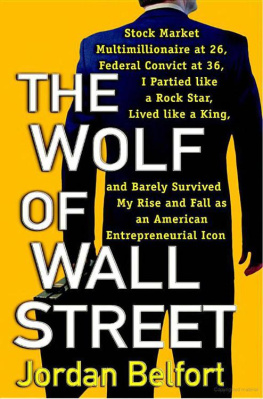In Bed with Wall Street
In Bed with Wall Street
The Conspiracy Crippling Our Global Economy
Larry Doyle

The author and publisher have provided this e-book to you for your personal use only. You may not make this e-book publicly available in any way. Copyright infringement is against the law. If you believe the copy of this e-book you are reading infringes on the authors copyright, please notify the publisher at: us.macmillanusa.com/piracy.
IN BED WITH WALL STREET
Copyright Larry Doyle, 2014
All rights reserved.
For information, address St. Martins Press, 175 Fifth Avenue, New York, N.Y. 10010.
First published in 2014 by PALGRAVE MACMILLAN in the U.S.
a division of St. Martins Press LLC, 175 Fifth Avenue, New York, NY 10010.
ISBN: 978-1-137-27872-2
Our eBooks may be purchased in bulk for promotional, educational, or business use. Please contact the Macmillan Corporate and Premium Sales Department at 1-800-221-7945, ext. 5442, or by e-mail at .
Library of Congress Cataloging-in-Publication Data
Doyle, Larry, 1960
In bed with Wall Street : the conspiracy crippling our global economy / Larry Doyle.
pages cm
ISBN 978-1-137-27872-2 (alk. paper)
1. FinancePolitical aspectsUnited States. 2. FinanceGovernment policyUnited States 3. Financial institutionsCorrupt practicesUnited States. 4. Monetary policyUnited States. 5. United StatesEconomic policy. I. Title.
HG181.D69 2014
332.0973dc23
2013028220
A catalogue record of the book is available from the British Library.
Design by Letra Libre, Inc.
First edition: January 2014
10 9 8 7 6 5 4 3 2 1
Printed in the United States of America.
Contents
Preface
Youre not going to really know anything for at least a year.
That was how my first boss, the king of Wall Street Larry Fink, welcomed me to the industry in the summer of 1983. Given that my initial terms of employment at First Boston only called for a two-year commitment on their part, I knew I had better get to work if I ever hoped to get a crack at the firms mortgage trading desk. I quickly appreciated that information and relationships mean everything on Wall Street. With the support of Fink and others, I did get that trading opportunity, and stayed at the firm until 1990.
While modern technology has brought real change to Wall Street over the last three decades, the industry remains centered on the principles of competition, information, value, and relationships. Not that these principles are always brought to bear for the benefit of investors. While inside, I learned that the more I embraced these tenets, the faster I could advance and succeed. But what about everyone outside?
For most Americans, Wall Street may as well be a foreign country. This occurs both by default and by design. Regrettably, those inside the industry are not at liberty to talk openly about how the industry really worksand only a very few people on the outside, with meaningful industry experience, have dug deeply into Wall Streets canyons to explain how it operates, especially within the realm of regulation. Thats why so many people around the world still dont understand what really happened on Wall Street in 2008 to bring our markets, economies, and nations to their knees.
With so much pain and anxiety emanating from the financial sector, questions quickly developed that to a large extent remain unanswered even todayexecutives, legislators, and regulatory officials are more interested in protecting their own interests than those of the public.
This was when I decided to launch my blog Sense on Cents (senseoncents.com), and subsequently to write this book. I believed I could help people understand much of what transpires in our economy at large and on Wall Street specifically, and I felt compelled to do it. I had no idea, back in 2009, what lay ahead.
The only agenda I had while writing this book was the pursuit of truth. Certainly the truth seems to come in a variety of shades these days. I hope my readers would agree that my desire to help people is its own most worthy goal. I try to achieve this by digging into what are often largely unread documents, full of arcane details, pertaining to issues and cases with broad impact. To do this effectively, I had to learn a lot about how other jobs on Wall Streetthe ones I never hadwork. Luckily, I discovered early in my professional career that if you want to get ahead, you had better know your stuff and add real value. As such, I knew that learning how the economy, markets, and securities worked from both a macro and micro standpoint was critical. And I also realized that an inquisitive mind and an appreciation of fundamental, technical, and psychological analysis of the markets would be beneficial to my readers.
Ive learned a lot more fascinating stuff in this pursuit than I ever knew while working at the large Wall Street banks. I strongly maintain that the rank and file worker on Wall Street also knows little of these paths, especially within the world of financial regulation. In fact, I believe that much of what lies along these paths is intentionally kept secret. The more I discovered, the more I wanted to learnand none of it was good. I have special empathy for those directly impacted by the failures of our regulators. The personal stories of many whistleblowers and countless individuals involved in the Madoff, Stanford Financial, mortgage frauds, auction-rate securities, and sundry other scandals are what drove me to dig deeper into how banks could have been so irresponsible and regulators so ineffective. I am humbled by the fact that well over a million people have visited my blog and that I have had numerous opportunities to share my knowledge via major media outlets.
Let me be clear: I love Wall Street. I enjoy the pace and relish the competition of the marketplace. Our nation needs vigorous and robust capital markets if we are to promote true free market capitalism. And Wall Street itself is overwhelmingly populated with great people. I count myself fortunate to have worked with incredibly talented people and to count so many as great friends. In fact, many have encouraged and endorsed my writing. I do not believe Wall Street is a zero-sum game, nor should it be run that way. Investors, consumers, taxpayers, and their capital need to be fully and properly protected. We need to expose the corrosive if not corruptible partnership that is the revolving door between Wall Street and Washington so that the public interest is truly protected. We need financial police who are not in bed with the industry and merely writing parking tickets, but rather true watchdogs who are concerned with the public welfare. In the same fashion, we need real political representatives who are not operating with hat in hand, filling their campaign coffers under the guise of public service. Our nation is suffering under both these constructs. Without real transparency and proper safeguards, investment capital will move elsewhereand then we all lose.
There is absolutely no way that I could have launched my blog or written this book if I were still working at any of the major Wall Street banks. Transparency and its accompanying truths are too often stifled by those in positions of power and influence. I hope this book serves to pull back the covers on Wall Street, Washington, and the regulatory agencies so American taxpayers, and investors and consumers everywhere, might see whats really going on. And I hope the exposition and discussion does not stop after these pages. If they do, the book will not meet my hopes and expectations. I hope further discussion ensues across the full spectrum of topics broached so that the truth may be further pursued, to the publics benefit.
Next page


